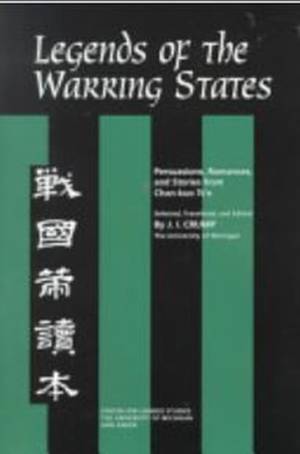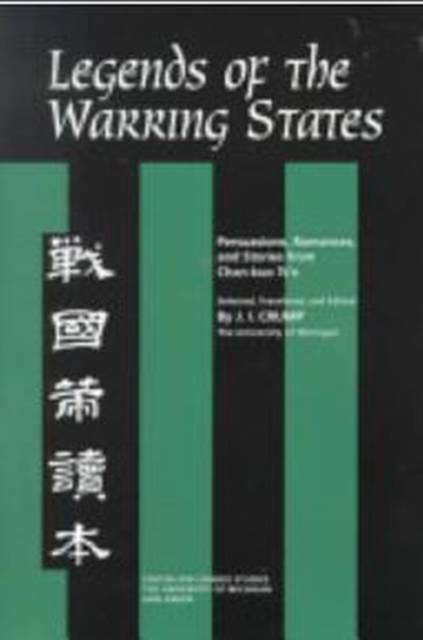
- Afhalen na 1 uur in een winkel met voorraad
- Gratis thuislevering in België vanaf € 30
- Ruim aanbod met 7 miljoen producten
- Afhalen na 1 uur in een winkel met voorraad
- Gratis thuislevering in België vanaf € 30
- Ruim aanbod met 7 miljoen producten
Zoeken
Legends of the Warring States
Persuasions, Romances, and Stories from Chan-Kuo Ts'e Volume 83
J Crump
€ 24,45
+ 48 punten
Omschrijving
The origins of the Chan-kuo Ts'e (Intrigues of the warring states) as an entity can be traced to a palace librarian at the Han Court, Liu Hsiang (76-6 BCE), who compiled and edited the pre-Han texts (c. 300-221 BCE) into a single volume and gave the collection a name. Thereafter, surviving manuscripts show the Chan-kuo Ts'e circulated during the Later Han Dynasty. Sometime during the years of decline and following the fall of the Han Dynasty, the Chan-kuo Ts'e began to acquire the aura of a wicked book, somewhat analogous to Niccolo Machiavelli's The Prince. From time to time it was seen as one of a number of books that could unlock immense power in an era characterized both by widespread illiteracy and common belief in literacy and scholarship as the best if not the only vehicle to any goal. After 400 CE, there is no record of the text until it was reconstructed by an 11th-century scholar, Tseng Kung, who formed a model for critical circulation for the next nine centuries.This volume presents selections and commentary by the premier Western translator and interpreter of the Chan-kuo Ts'e--ninety pieces singled out for their literary sophistication and sprightliness of conception. It also features more complete warring states narratives, the "romances"--persuasions of four of the best-known figures, Fan Chü, Chang Yi, Su Ch'in, and Ch'un-shen Chün, augmented by biographical material from the Shi-chi. This reader highlights both the nature of Chan-kuo Ts'e, an important pre-Han collection, and its considerable pleasures.
Specificaties
Betrokkenen
- Auteur(s):
- Uitgeverij:
Inhoud
- Aantal bladzijden:
- 200
- Taal:
- Engels
- Reeks:
- Reeksnummer:
- nr. 83
Eigenschappen
- Productcode (EAN):
- 9780892641291
- Verschijningsdatum:
- 1/01/1998
- Uitvoering:
- Paperback
- Formaat:
- Trade paperback (VS)
- Afmetingen:
- 149 mm x 233 mm
- Gewicht:
- 335 g

Alleen bij Standaard Boekhandel
+ 48 punten op je klantenkaart van Standaard Boekhandel
Beoordelingen
We publiceren alleen reviews die voldoen aan de voorwaarden voor reviews. Bekijk onze voorwaarden voor reviews.







